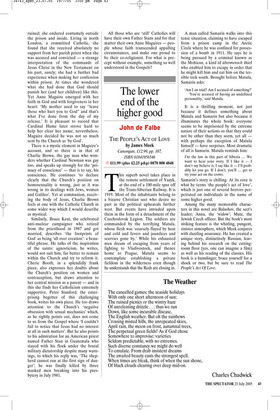The lower end of the higher good
John de Falbe
THE PEOPLE’S ACT OF LOVE by James Meek Canongate, £12.99, pp. 387, ISBN 01841956546 ✆ £11.99 (plus £2.25 p&p) 0870 800 4848 This superb novel takes place in the remote settlement of Yazyk, at the end of a 100-mile spur off the Trans-Siberian Railway. It is 1919. Most of the inhabitants belong to a bizarre Christian sect who desire no part in the political upheavals further west. But events have intruded upon them in the form of a detachment of the Czechoslovak Legion. The soldiers are commanded by the terrifying Matula, whose flesh was ‘coarsely flayed by heat and cold and fevers and jaundices and scurvies gone by.’ While his exhausted men dream of escaping from years of fighting to Vladivostock, and thence home to Prague, Matula seems to contemplate establishing a private fiefdom in the wilderness even though he understands that the Reds are closing in. A man called Samarin walks into this tense situation, claiming to have escaped from a prison camp in the Arctic Circle where he was confined for possession of a bomb in 1911. He says he is being pursued by a criminal known as the Mohican, a kind of übermensch thief who enabled him to escape in order that he might kill him and eat him on the terrible trek south. Brought before Matula, Samarin asks:
‘Am I on trial? Am I accused of something?’ ‘You’re accused of having an undefined personality,’ said Matula.
It is a thrilling moment, not just because it defines something about Matula and Samarin but also because it illuminates the whole book: everyone seems to be imprisoned by the extreme nature of their actions so that they could not be other than they seem, yet all with perhaps the exception of Matula himself — have surprises. Most dramatic of all is Samarin. Matula reminds him:
I’m the law in this part of Siberia ... We want to hear your story. If I like it — I don’t say believe it, I say like it — I’ll probably let you go. If I don’t, you’ll ... get to try your act on the crows.
Samarin’s story is chilling. At its core is what he terms ‘the people’s act of love’, which is just one of several horrors perpetrated on individuals in the name of some higher good.
Among the many memorable characters in this novel are Balashov, the sect’s leader; Anna, the ‘widow’; Mutz, the Jewish Czech officer. But the book’s most striking feature is the whirling, pungent, sinister atmosphere, which Meek conjures with dazzling assurance. He has created a unique story, distinctively Russian, leaving behind his research on the cuttingroom floor (yes, one can imagine a film) as well as his reading of the classics. His book is a humdinger; brace yourself for a shock or two, but be sure to read The People’s Act Of Love.















































 Previous page
Previous page